Overview:
It Is Impossible To Exaggerate The Significance Of Protein In Our Meals In The Health-Conscious Society Of Today. Although Many People Only Think Of Animal Products As Sources Of Protein, There Are Plenty Of Vegetarian Options Available For Those Who Want To Stick To A Meatless Diet. Vegetarian Protein Sources Provide A Wide Variety Of Options To Satisfy Your Dietary Needs, Ranging From Grains To Legumes To Dairy Substitutes. Let’s Explore This Thorough Guide To Learn Everything There Is To Know About Protein Sources That Are Vegetarian.
Knowing Protein And Its Significance Amino Acids, Which Make Up Proteins, Are Important Macronutrients That Are Frequently Referred To As The Building Blocks Of Life. They Are Essential For Many Body Processes, Such As The Synthesis Of Enzymes, Immunological Response, Hormone Regulation, And Muscle Growth And Repair. Regardless Of Dietary Preferences, Consuming Enough Protein Is Essential For General Health And Wellbeing.
Essential Things Vegetarians Should Know It Can Occasionally Be Difficult For Vegetarians To Consume Enough Protein In Their Diet. Vegetarians, In Contrast To Their Omnivore Colleagues, Have To Choose Their Plant-Based Sources Carefully In Order To Receive The Recommended Amount Of Protein Each Day. However, Achieving The Required Protein Intake On A Vegetarian Diet Is Completely Possible With The Right Preparation And Information.
Ditching the meat and dairy, but not sure you’ll meet your protein requirements? Stop worrying, right now. There are plenty of plant-based sources of protein for you to sink your teeth into. We’ve listed a few to get you started.
Quinoa:
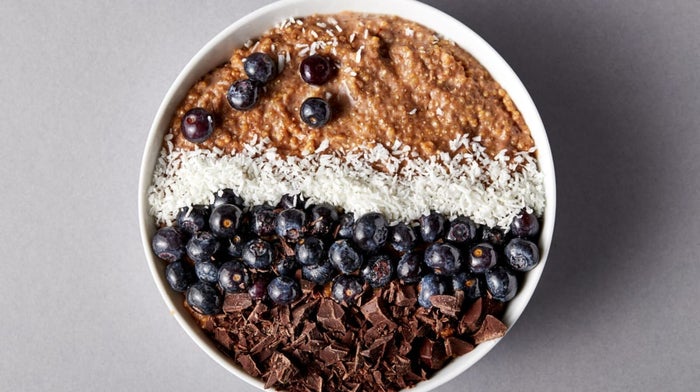
Quinoa (pronounced keen-wah, for the record!) is arguably one of the greatest protein (and carbohydrate) sources for vegetarians and vegans. It’s couscous-like consistency makes it highly versatile for use in salads, casseroles and even breakfast bowl recipes.
Quinoa is also high in iron, fibre and magnesium, which makes it the perfect wholefood.
Macros (100g):
Protein – 14g
Carbohydrates – 64g
Fat – 6g
Chia Seeds:
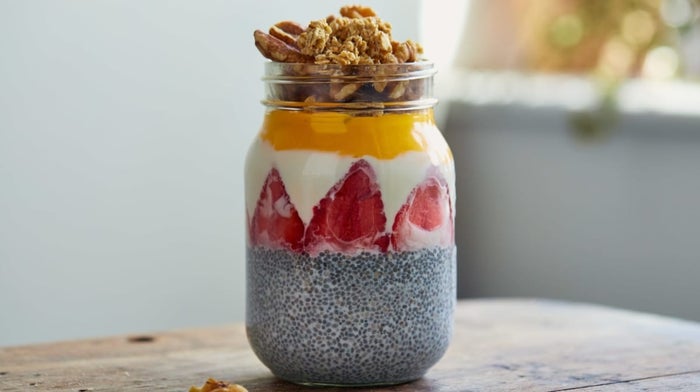
Chia seeds have grown in popularity as of late, due to their high omega-3 content — higher than any other plant-based food. Their consistency when mixed with liquid makes them excellent in recipes, especially as a substitute for eggs.
They are also packed with iron, zinc, and calcium, as well as lots of antioxidants. Check out these 3 chia pudding recipes for inspiration.
Macros (100g):
Protein – 17g
Carbohydrates – 42g
Fat – 31g
Soy:
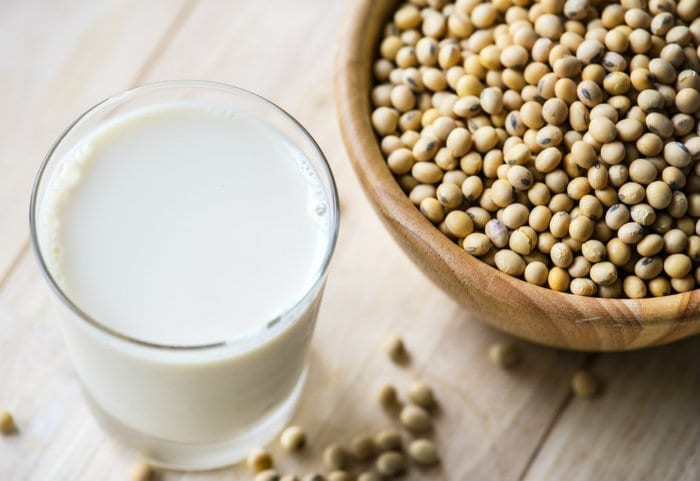
Soy beans are a great addition to any salad, recipe and are great to snack on too. There are lots of products derived from soy beans, such as tofu, tempeh, and edamame beans.
It’s one of the greatest sources of protein for vegetarians and vegans and is often also used in protein shakes.
Macros (100g):
Protein – 36g
Carbohydrates – 30g
Fat – 20g
Beans:
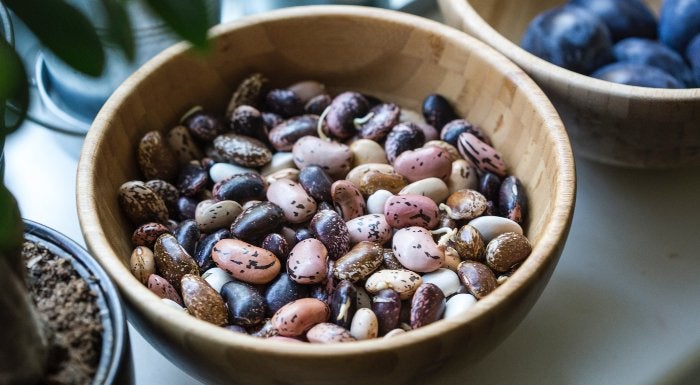
There are dozens of varieties of beans, from black beans, to pinto beans. They make an excellent salad, and can be combined with other food such as rice to make a tasty dish high in protein and complex carbs.
The macros listed are for black beans.
Macros (100g):
Protein – 22g
Carbohydrates – 62g
Fat – 1.4g
Hempseed:
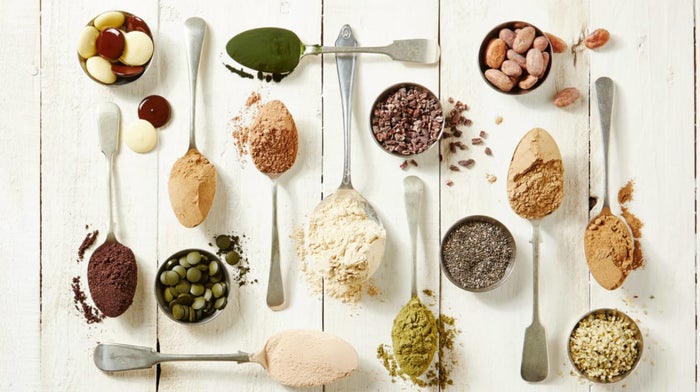
Hempseed is an excellent source of protein, high in magnesium, zinc, iron and calcium. It contains large amount of all nine essential amino acids, as well as fatty acids such as omega 3
They are most commonly consumed in supplement form. The macro-nutritents for our Hemp Protein are:
Macros (100g):
Protein – 50g
Carbohydrates – 26g
Fat – 12g
Nuts:

Nuts, such as almonds, peanuts, cashews etc. are all excellent sources of protein. They can also be bought in the form of nut butters.
The macro-nutrients for peanuts are as follows:
Macros (100g):
Protein – 26g
Carbohydrates – 49g
Fat – 16g
Chickpeas:
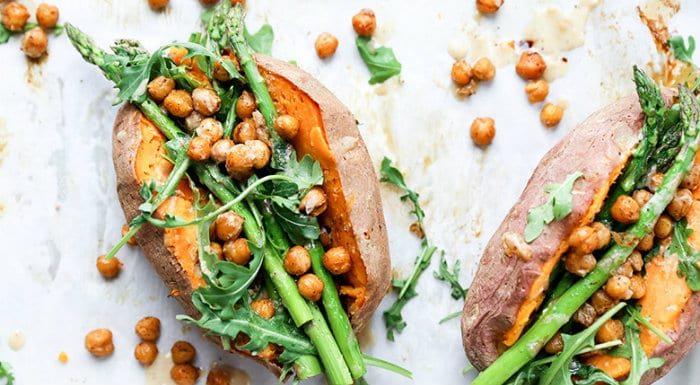
Chickpeas are highly versatile legumes, packing essential amino acids with a high protein content.
They are also used to make hummus, which is a great topping/dip for any snack.
Macros (100g):
Protein – 19g
Carbohydrates – 61g
Fat – 6g
Green Peas
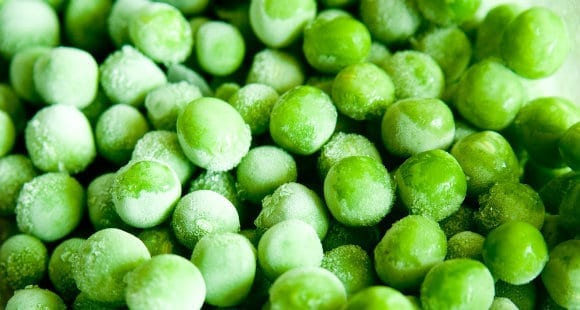
Great tasting, one of your fruit and veg additions and low in calories. They don’t have as much protein as some of the other items on the list, but for a vegetable, they have excellent macronutrient ratios:
Macros (100g):
Protein – 1.8g
Carbohydrates – 7g
Fat – 1.2g
Vegetarian/Vegan Supplements:
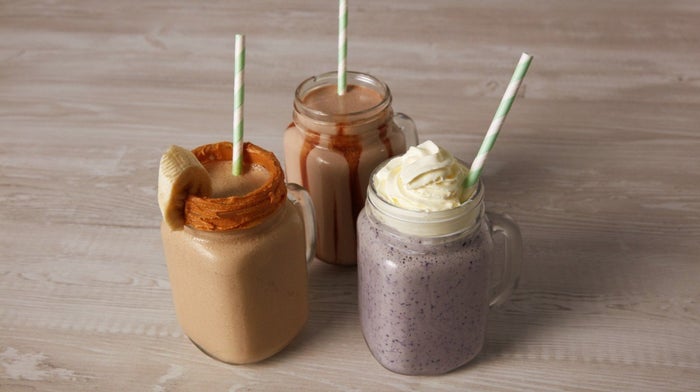
Many of the protein sources listed here can be bought in supplement form, soy & pea protein etc. These offer a higher protein content than the raw forms, and are quick, easy and convenient to consume.
A tasty and convenient way to get your protein in, our Vegan Blend made from pea and faba bean isolate comes in 5 delicious flavours, including chocolate and turmeric latte. The macro-nutrients are:
Macros (100g):
Protein – 73g
Carbohydrates – 14g
Fat – 1.8g
Take Home Message:
You don’t have to be a lean, mean, chicken eating machine to make gains today. There are so many vegan protein sources and so many recipes to help you find meals you love using them.
Train up your chef skills and implement a few of these high protein sources into your meals, and make the ve-gains of your dreams.
Sources Of Plant-Based Protein:
Legumes:
Beans, Lentils, And Chickpeas Are Examples Of Legumes That Are Among The Greatest Sources Of Protein Derived From Plants. They Are A Great Complement To Any Vegetarian Diet Because They Are Also Abundant In Fiber, Vitamins, And Minerals. Adding Beans To Soups, Salads, And Stews Is A Great Way To Increase Protein Consumption.
Grains:
In Addition To Being Nutrient-Dense, Whole Grains Like Quinoa, Brown Rice, And Oats Also Have A Respectable Amount Of Protein. Among The Complete Proteins Is Quinoa, Which Has All Nine Of The Essential Amino Acids. Vegetarians Can Have A Satisfying And High-Protein Choice By Include Grains In Their Diets.
Seeds And Nuts:
Nutrients, Good Fats, And Protein Are Abundant In Almonds, Walnuts, Chia Seeds, And Hemp Seeds. They Can Be Added To Salads, Yogurt, Or Smoothies To Boost Protein Content. They Also Make Excellent Easy Snacks.
Soy-Based Products:
For Vegetarians, Soybeans And Related Products—Such As Tempeh, Tofu, And Edamame—Are Attractive Options Because Of Their High Protein Content And Adaptability In The Kitchen. Particularly Tofu Is Good At Absorbing Flavors And Works Well In Both Savory And Sweet Recipes.
Dairy Products And Substitutes:
Dairy Products Are High In Calcium And Protein, Including Cheese, Greek Yogurt, And Cottage Cheese. Almond Milk, Soy Milk, And Oat Milk Are Plant-Based Substitutes That Are High In Protein And Enriched With Vital Vitamins And Minerals, Making Them Great Options For Vegans.
Seitan:
Made From Wheat Protein, Seitan, Also Called Wheat Gluten, Is A Meat Alternative. It Is A Popular Food Because Of Its Chewy Texture And Versatility In Terms Of Seasoning And Cooking Option For Meals That Are Vegetarian.
Eggs:
Eggs Are A Nutrient-Dense Source Of Protein That Have All Nine Of The Required Amino Acids For Lacto-Ovo Vegetarians. Either Boiled, Scrambled, Or Added To Omelets And Frittatas, They Are Delicious.
Fulfilling Your Needs For Protein On A Vegetarian Diet Although Each Person’s Requirements For Protein Differ Depending On Age, Gender, Degree Of Physical Activity, And General Health, The Recommended Dietary Allowance (RDA) For Protein Is Roughly 0.8 Grams Per Kilogram Of Body Weight. This Requirement Is Easily Met By Vegetarians By Incorporating A Range Of Plant Foods High In Protein Into Their Daily Meals.
Advice On Increasing Protein Consumption:
Vary The Sources Of Your Protein:
Including A Choice Of Plant-Based Proteins Guarantees That You Get All The Necessary Amino Acids And A Good Amount Of Other Nutrients.
Mix Completion Proteins:
A Meal’s Total Protein Content Can Be Increased By Serving Complementary Protein Sources Together, Such As Hummus And Whole Wheat Pita Or Beans And Rice.
Examine Portion Sizes Carefully:
Plant-Based Proteins Are Nutrient-Dense, But In Order To Keep A Balanced Diet, You Must Eat Them In The Right Amounts.
Examine Labels:
Be Sure To Read The Labels Of Packaged Vegetarian Items, Like Veggie Burgers Or Meat Alternatives, To Find Out The Protein And Ingredient Counts.
Examine Supplements For Protein:
When Consuming Entire Meals Isn’t Always Possible, Protein Supplements Like Rice Protein Powder Or Pea Protein Can Be A Handy Substitute.
Possible Difficulties To Steer Clear :
Overindulging In Processed Foods:
Although Highly Processed Vegetarian Meals May Be Handy, Rich In Harmful Fats, Added Sugars, And Sodium. It Is Important To Give Complete, Minimally Processed Options Priority.
Ignoring Supplementary Nutrients:
Don’t Forget About Other Important Nutrients Like Vitamins, Minerals, And Fiber While You’re Concentrating On Protein. A Range Of Nutrient-Dense Foods Should Be A Part Of A Well-Rounded Vegetarian Diet.
Not Getting Enough Hydration:
Plant-Based Or Not, Diets High In Protein Can Make The Body Require More Water. Make Sure You Drink Lots Of Water Throughout The Day To Be Well Hydrated.
Summary:
Vegetarian Diets Include A Wealth Of High-Protein Choices That Can Enhance General Health And Wellbeing. You May Easily Meet Your Protein Needs Without Using Animal Products By Include A Variety Of Plant-Based Foods In Your Meals And Being Mindful Of Portion Sizes And Nutrient Balance. With Appropriate With The Right Preparation And Understanding, Vegetarianism May Be A Healthful And Fulfilling Eating Option For People Of All Ages.
